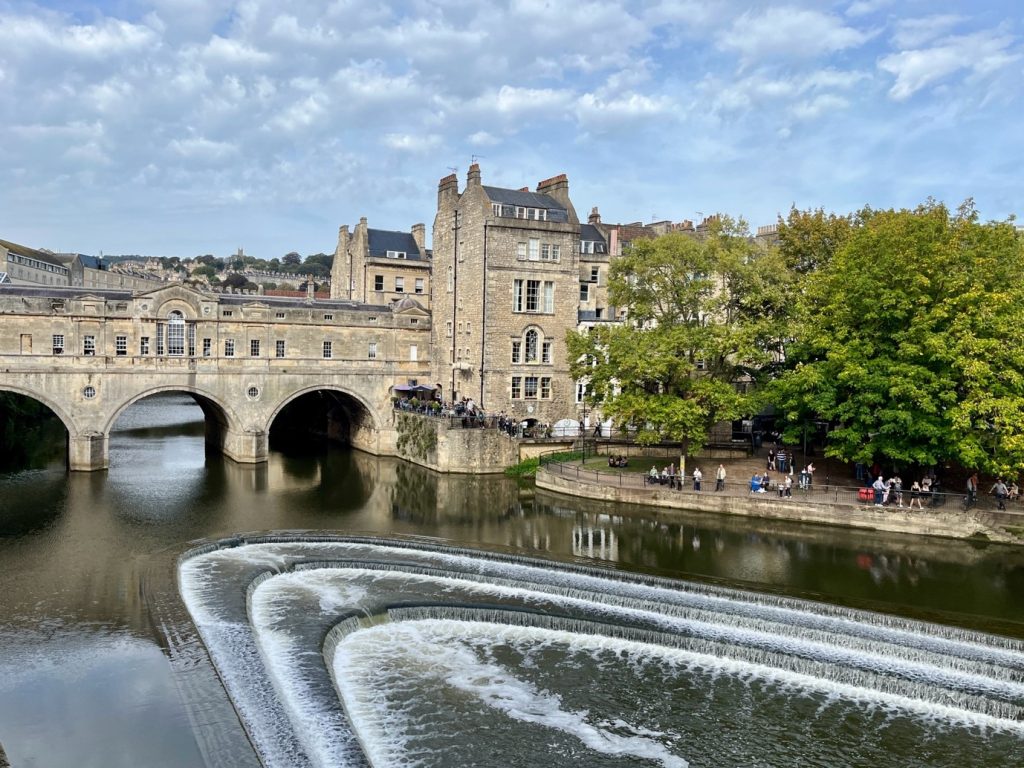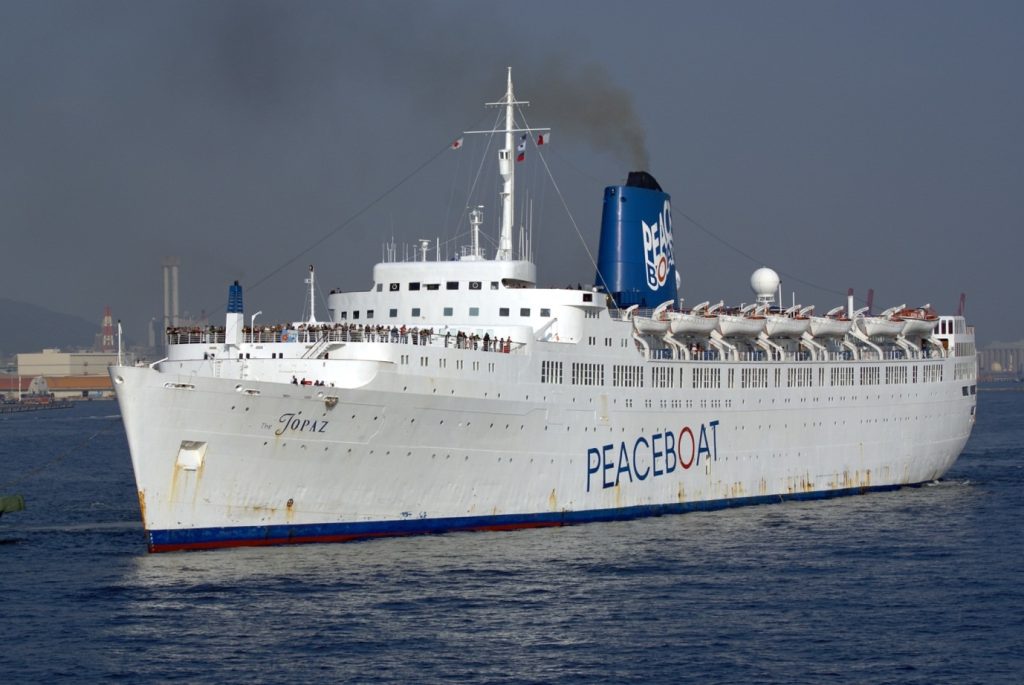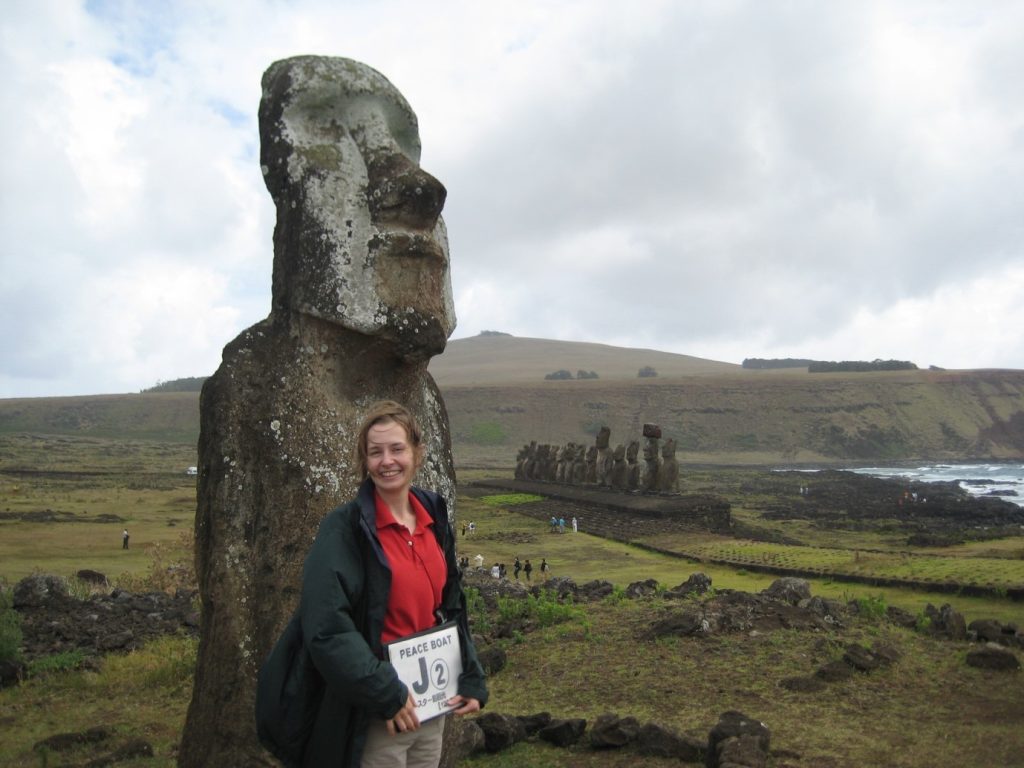The Blonde Interpreter – Part 3
Bath is a beautiful city, of which I fear I saw too little during my year on the MA Interpreting and Translation course at the University of Bath. My days began with a trek up the hill from the university accommodation at the bottom to the campus at the top, with its lake and its rabbits and its conference interpreting suite. My classmates came mainly from Japan, and were at different stages of their journeys, with some fresh out of university and others seeking a change of career. There were two of us native English speakers, and one remarkable German polyglot for whom both Japanese and English were second languages.

I won’t go into too much detail, since most JACI readers will have been through similar training at some stage. We started with memory exercises and shadowing, and moved on to practice consecutive, simultaneous, liaison and public service interpreting. SI lessons took place in the excellent conference interpreting suite with its not-always-reliable technology, as did the regular mock conferences, where interpreting students from all language streams took turns to play the part of both interpreters and conference delegates. PSI and liaison classes also involved role-play, and having left my acting “career” behind in Oxford, I was happy to fill in as business-person, policeman, or patient as necessary. What I found less comfortable was the fact that these classes took place in the university’s TV studio, and were filmed. This of course meant we were expected to watch our own and our classmates’ performances with a critical eye, and provide feedback. Considering how little I enjoyed watching myself on screen, perhaps it’s good that I gave up any hope of being Julia Roberts early, although it was by no means the last time I would find myself in front of the camera.
Many years later, one of my interpreting teachers reminded me of something I had completely forgotten, which perhaps shows what a dedicated (and strange) student I was. On the day of our interpreting exams, she said, she remembered me showing up to campus pulling a small suitcase full of dictionaries. I seem to remember being given topics a few minutes before the start of the exams so that we could use those precious moments to prepare. And how could I prepare without my trusty dictionaries?! I seem to remember those same dictionaries half-filling my suitcase whenever I travelled home during the university holidays, too. It makes me wonder what I did for clothes. They still sit on the shelves of my study, rarely used but comforting. Bought during that first visit to Japan at which point, with just six months of Japanese study under my belt, I had little use for any of them. Indeed, I could barely read their Japanese titles, and relied solely on the list given to us by our professors to even know what to buy.
The final part of the MA course required us to write either a translation with commentary, or a dissertation on an aspect of translation or interpreting. Mine was about the dubbing of Studio Ghibli films. I was interested in audio visual translation, and although I had never been particularly interested in anime, it provided the biggest body of English-dubbed Japanese films I could think of. I didn’t know it at the time, but this was to be the beginning of a professional relationship with anime that continues to this day, though (whisper it) I still wouldn’t call myself a fan.
Despite finishing the course with good grades, I still lacked confidence in my interpreting abilities to the point where I wasn’t convinced that anyone would actually pay me money to interpret for them. My next move neatly sidestepped that problem: volunteering. I learnt about Peace Boat from one of my former Kyoto classmates, as well as a sempai from Bath, who had also taken up the opportunity. A Japan-based international NGO working to promote peace, human rights, and sustainability, one way in which Peace Boat fulfils its aims is by organizing three-month round-the-world sea voyages. On board are paying guests (mostly Japanese), volunteers, English and Spanish teachers, and guest speakers from every country visited along the way. And of course, interpreters, or rather Communication Coordinators (CCs). We were a small team, working with Japanese, English and Spanish. At sea, our main job was to interpret for on-board talks, lectures and seminars on topics related to our ports of call. On land, we interpreted for the local English and Spanish speaking guides on the many excursions, whether visiting tourist hot-spots, participating in local community groups, or paying respects at war memorials.
The cruise was far from luxurious. The ship itself was on its final voyage, and was due to retire on its return to Japan. CCs slept in bunkbeds, four to a cabin. The décor was outdated, food was served in a simple canteen, and all on-board activities were DIY. Guests and staff were encouraged to share their talents and devise their own entertainment, and the CCs were no exception. Thus I find myself torturing passengers with a violin recital (on an instrument that was one of many on board destined to be handed over to a youth orchestra in Venezuela), giving a presentation about all things Welsh, having tea with a guest who had “won” me in an auction, and teaching a rag-tag choir Christmas carols with which to entertain everyone over Christmas dinner (served, if I recall, somewhere between New Zealand and Australia).

I know I’m not the first to write about Peace Boat for JACI, so I hope you’ll excuse any duplication. But if it means another chance for a young interpreter just starting out to find out about this fabulous opportunity, so much the better. The work isn’t easy. Internet connection (at least when I was onboard) was expensive and extremely slow. I would type up letters to friends and family, then go online for just long enough to copy and paste them into Hotmail and hit “send”. Doing any kind of online research on the ports we would be visiting or topics we would be interpreting for was impossible. Nevertheless, we prepared as best we could. Our staffroom had shelves of guidebooks, which we would pore over once we had been allocated our respective excursions. And best of all, there were the tour reports of legions of former CCs, more than familiar with our predicament, full of nuggets of wisdom such as “The guide will show you a display of rocks in the town museum; make sure you know how to say ‘sedimentary’, ‘igneous’ and ‘metamorphic’ in Japanese”. Our saviours.
So it is that I am in the strange position of having been to a number of countries and regions that many have only dreamed of (think Easter Island, Machu Pichu, Tahiti, Papua New Guinea)… but only for one day each. Peace Boat are always on the look-out for good CCs, and I highly recommend it as a way to gain interpreting experience while seeing the world. I was invited back a few years later to join the ship (a different ship by this point – a bit newer, a bit blingier) for a short stretch between London and Iceland. Scandinavia had not been part of my earlier itinerary, which had followed the “central” route via the Suez and Panama Canals, so I jumped at the chance to cruise the fjords.

I returned to the UK even more convinced that interpreting was the career for me, and yet I still somehow wasn’t ready. There still seemed to be a piece of the puzzle missing, a gap in my experience that I set out to fill. I had worked in Japan for two years and obtained a master’s degree, but I had yet to set foot in the corporate world. So what I needed next was an office job, working with Japanese, and an opportunity to put the business Japanese that I had learnt at Bath to the test. I may not get to do any interpreting, but for now, this would be enough. I based myself in London, and started applying for jobs with Japanese companies. It might even provide me with a specialisation that would help me stand out from the crowd when I started applying for interpreting jobs down the line.
After months of searching, I ended up at the European headquarters of the telecoms company NEC, working in the PR department initially, and then the corporate development team. Comms were for the most part in English, but both department heads and a number of my colleagues were Japanese. I was accepted as part of the ex-pat contingent, and party to just as many complaints from Japanese staff about Europeans (why could they not just do what they said they would, when they said they would?) as I was to European complaints about Japanese colleagues (why couldn’t they just relax a bit?). I proof-read press releases and hounded European branch offices for figures, seethed at the corporate PowerPoint obsession (why explain something in a few sentences when you could put together a ten-page slide deck?), and somehow ended up in charge of redesigning the company intranet.
At some point, my boss decided to trust me to interpret for some visitors from head office and watched my eyes light up. Perhaps he knew then that I wouldn’t be with him for long. I had already started accepting small interpreting assignments at evenings and weekends when, almost two years to the day, I quit my job at NEC. I had never intended for it to be long term, and who knows how long it would have lasted had a Japanese friend from Bath not told me that, in Japan, unless you had worked somewhere for two years, it “didn’t count.”
I had always suspected that I would need to work freelance if I wanted to make a go of it as an interpreter in the UK. When looking for jobs after Peace Boat I had kept an eye out for in-house interpreting and translating opportunities, but they were few and far between. I occasionally came across jobs working for banks (mostly translating) and car manufacturers, but very little else. There were also translation positions advertised periodically for Nintendo in Germany. Little chance, then, to specialise in any particular field. It is also harder here than in Japan to specialise as a freelancer. There just doesn’t seem to be enough work in any one specialism to support an entire career, so most of us start out, at least, as jacks of all trades. Translators are more likely to specialise, be it in finance, patents, chemistry or law, and of course, some interpreters also find their niche. A very well-respected British interpreter is in-demand for international tax disputes and arbitrations, for example. Others are particularly knowledgeable in nuclear energy or pharmaceuticals, although there is rarely enough work in their area of specialisation to keep them in constant employment. I, too, have found myself gravitating towards certain kinds of work over the years, but in 2010 I was ready to take on anything that came along. I updated my CV and started working my way through the Institute of Translation and Interpreting’s list of corporate members.

Bethan Jones
Bethan is a freelance Japanese-English interpreter based in London, UK. She has been “full-time freelance” since 2010 and alongside interpreting and the odd bit of translation, dabbles in presenting for TV and live events. Her interpreting work spans the areas of business, culture, and beyond, and she has been fortunate enough to work with well-known figures such as Hirokazu Kore-eda, Ryusuke Hamaguchi, Makoto Shinkai, Sayaka Murata and Marie Kondo. https://bethanjonesinterpreter.com/
(Photo credit: Eddie Judd Photography)